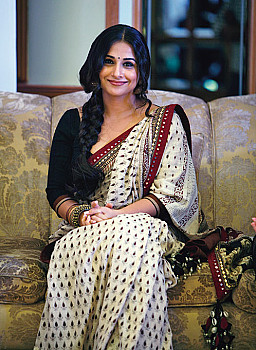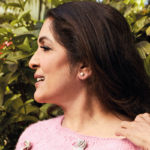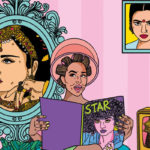The Power Of Self
My personal sense of power stems from the fact that there is only one of me. All of us are individuals and every individual is unique. There’s no scope for a ‘best’ in a world of individuals. So, if I am the only one in my world then I am the best and the worst there can be. I’m not competing with anyone else.
The term ‘Power’ means different things for different people – and different things even to one person at different ages. As a kid and when I was growing up, I associated power with someone who was bigger or stronger. And, hailing, as I do, from a not conservative, but a traditional South Indian family, power meant God. We always spoke about God being the all-powerful, the supreme energy who made the impossible, possible.
As recently as five years ago I ‘discovered’ yet another angle to the definition of power. Every year, we have power lists with men and women from different fields. But the power that I am referring to is something very individual, not one that is found only in successful people or public figures. This power – and its source – lies within you, in every human being, and that is what makes you really powerful. In the real and ultimate sense, any individual, man or woman, who lives life on his/her own terms can be said to be powerful…someone who has the courage to make choices and be unapologetic about them. They are the people who have discovered the power within themselves and therefore have been able to stand tall and emerge strong in their own right.
This realisation came about the time I had done Paa (2008) and tasted overnight success. Around the same time I also tapped into another source of strength that all of us have – family. I’ve always been very attached to my family but it was at this time that I began to value (more than ever) the fact that my family loved and accepted me unconditionally. Irrespective of whether I was being criticised for my weight or my clothing or my pairing with another actor, their love is non judgemental and complete. That gave me a great amount of perspective and even courage to continue being me!
I also drew strength from two other people who came into my life – R Balki and Sabyasachi Mukherjee. Balki had come to me with Paa – that was really reassuring…that he believed in me as an actor. Once, on a flight back from a shoot, Balki told me that I should look for my power within what I was: “You are intrinsically and quintessentially Indian and there is no one like you today. Why are you giving it all up to be one amongst many? So, discover who you are and use it to your advantage!” It was a lesson that was repeated by Sabyasachi when he told me, “You’re so beautifully Indian. If some clothes don’t suit you, it is fine. Wear just what makes you feel good and when you feel good, you’ll always look great.” Conversations with my parents, my sister and my brother-in-law helped me discover that power didn’t come with success. Success came with power.
My work is an extension of my belief. I don’t think I’d be able to play someone who’s just a prop or someone who needs to dumb herself down. For me even if I start as someone who may be weak, the resolution has to have her emerging a winner. I happen to be a woman but I could have been a man and I would have still looked for that in the characters that I played.
There is always a give and take in the characters. The Dirty Picture liberated me. I lost all kind of body consciousness, for, to do the role, I had to come alive in front of the camera and not be conscious of my body, else it would have looked sleazy. The character used her body shamelessly, unapologetically. She almost celebrated her sexuality and thrust it in your face and said, look this is what I’ve got. I’ve heard actors say when the line between you and the character gets blurred, it’s a high…it’s like you’ve tasted blood. I think I’ve tasted it in small measures and I’m just getting more greedy.
Post The Dirty Picture women kept coming up to me, telling me that they feel unapologetic about their sizes and now love their curves. And I loved what they said because that’s a battle I’ve also fought all my life. Literally, I’m calling it a battle because, for women the body becomes a battle. The body that we should love, the body that we should accept, celebrate and pamper, becomes the biggest bone of contention against ourselves.
The power of the characters that I have played is seen in the reactions I get. After Ishqiya I had women in smaller towns and villages, even in Mumbai, actually come to me and say, “It felt great that you killed your husband and burnt him at the end. He had tortured you a lot. Hamesha hum chhup kyun rahein,kyun sahein? (Why should we always keep quiet and suffer?) There was a sense of vindication somewhere. Probably they were themselves in situations where they had been cheated upon or their trust had been betrayed and they were all feeling vindicated.
After Paa, a patient told me, “You know what I loved most about your character was that you were so accepting of your child.” She mentioned a scene in the park where someone comes up and says, “What’s wrong with your son?” and I turn around and say he’s special, and she is dumbstruck. And the real-life woman told me that she wished that everyone with a disability or a disease or with any kind of challenge was able to deal with things like that. “It happens and you have to hold your head high and just go through life and say you know it’s happened to us because we’re special.” I told her, “Hats off to you for being able to say that,” because she was in a wheelchair for life.
So many instances come to mind – that of a little boy in a wheelchair whom I met in Pondicherry. I was shooting and his parents came up to me and said that he was a big fan of mine. He loved the way I said ‘Good Morning, Mumbai’. He was in the restaurant and I was shooting on the road. I went inside to meet him. He said when you smile, even I want to smile. I had tears in my eyes.
You don’t realise the kind of impact your work could have. I think those are the moments when you feel really blessed because, you’re living your dream and it’s touching people’s lives and sometimes transforming them, in good ways hopefully.
Verve Power issue’s cover girl last year, Vidya Balan is an award-winning actor who is known for her strong women-oriented roles. Post her arresting performances in Kahaani, The Dirty Picture and Ishqiya the versatile actor has shown that she is a ‘female hero’ who creates her own fascinating journey on celluloid
Related posts from Verve:
Verve Trending
Sorry. No data so far.
us on Facebook to stay updated with the latest trends






